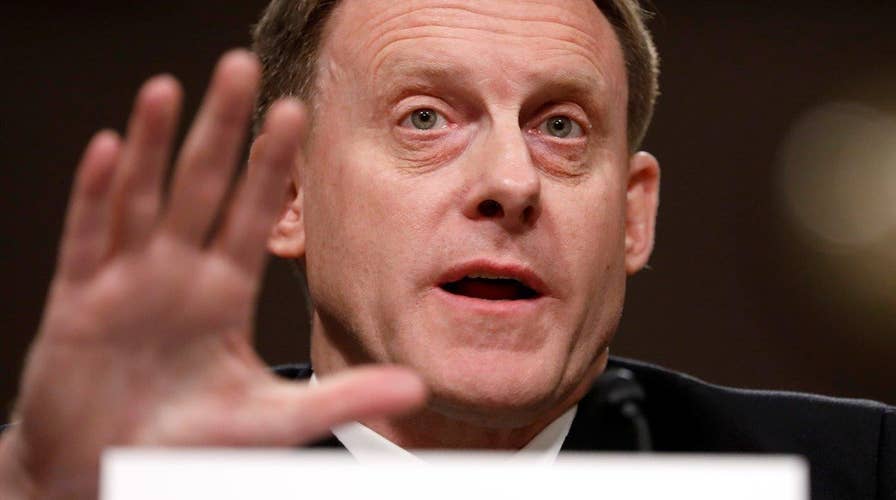NSA Director Rogers testifies on Flynn, leaks and unmasking
Reaction and analysis on 'The Fox News Specialists'
Top members of President Trump’s intelligence team faced a tense Senate hearing Wednesday as they declined to discuss conversations with the president about the FBI's Russia investigation -- but denied they were ordered to act inappropriately.
The witnesses before the Senate Intelligence Committee were peppered with questions in the wake of a report that Trump pressured one of them, Director of National Intelligence Dan Coats, to help wind down the Russia probe.
Coats and others gave a blanket denial, saying they did not face pressure regarding any investigation.
But they repeatedly declined to discuss details of their talks with Trump, frustrating some Democratic senators -- in a hearing that served as a prelude to ex-FBI Director James Comey's appearance before the same panel on Thursday.
“We are in a public session here,” Coats told the Senate Intelligence Committee. “I don’t feel it’s appropriate to share confidential [information] here.”
Coats, however, said he “intends” to answer such questions in private after consulting with the White House legal counsel.
On Thursday, committee members are expected to ask Comey whether Trump pressured him to slow or conclude the investigation into whether the Trump campaign colluded with Russia in the 2016 White House race and specifically to stop investigating former national security adviser Michael Flynn.
The president last month fired Comey, saying he “wasn’t doing a good job.”
National Security Agency Director Adm. Mike Rogers also testified Tuesday before the committee.
“I have, in the three-plus years leading [the agency], to the best of my knowledge, never been directed to do anything I believed to be illegal, immoral or inappropriate … or have felt pressure to do so,” he told committee members.
Rogers also expressed a desire to discuss the matters in private but not before talking with the White House legal team.
Also testifying Wednesday were Deputy Attorney General Rod Rosenstein and Acting FBI Director Andrew McCabe.
Rosenstein declined to talk about why Attorney General Jeff Sessions recused himself from the Russia investigation and what role the AG played in Comey’s firing.
McCabe declined to discuss his conversations with Comey or the loyalty pledge Trump purportedly asked Comey to take before firing him.
“I'll let Comey speak to this himself, tomorrow,” McCabe said.
All four witnesses declined to answer directly when asked whether they kept notes on their Russia-related discussions with Trump.
The Washington Post had reported overnight that Trump had approached Coats about pressuring the FBI to back off its probe on Flynn, and had asked Rogers to deny there was evidence of coordination with Russia.
Virginia Sen. Mark Warner, the top Democrat on the committee, said Wednesday he was “disappointed” by Rogers’ response and said Rogers and Coats had the “chance to lay to rest” questions about Trump allegedly pressuring members of the U.S. intelligence community.
The committee chairman, North Carolina GOP Sen. Richard Burr, called Wednesday's hearing to debate reauthorizing a key part of a U.S. surveillance law that is set to expire later this year.
“This is not the time to needlessly roll back our capabilities,” Burr said at the start of the hearing.
However, Warner made clear at the opening that he would ask the witnesses about the investigation into whether the Trump campaign colluded with Russia and if Trump asked any of them to try to quash the FBI’s probe.
Comey purportedly wrote a memo stating Trump tried to get him to back off investigating Flynn.
The back-to-back hearings come as the White House grapples with the fallout from Comey's firing, which led to the appointment of a special counsel to take over the Russia investigation in an effort to prevent even the appearance of Oval Office interference.
Russia's role in the 2016 presidential election, and ensuing congressional and FBI investigations into Moscow's ties with Trump associates has dogged the president since he took office.
White House officials had weighed trying to block Comey from testifying on Thursday by arguing that his discussions with the president pertained to national security and that there was an expectation of privacy. However, officials ultimately concluded that the optics of taking that step would be worse than the risk of letting the former FBI director testify freely.
“I wish him luck,” Trump said Tuesday.
Early Wednesday, Trump announced his pick to succeed Comey at the FBI -- Christopher Wray, a former Justice Department official who served as New Jersey Gov. Chris Christie's lawyer during the George Washington Bridge lane-closing investigation.
Trump has consistently pushed back against suggestions that his campaign coordinated with Russia and has called the investigation a hoax.
The Associated Press contributed to this report.













































